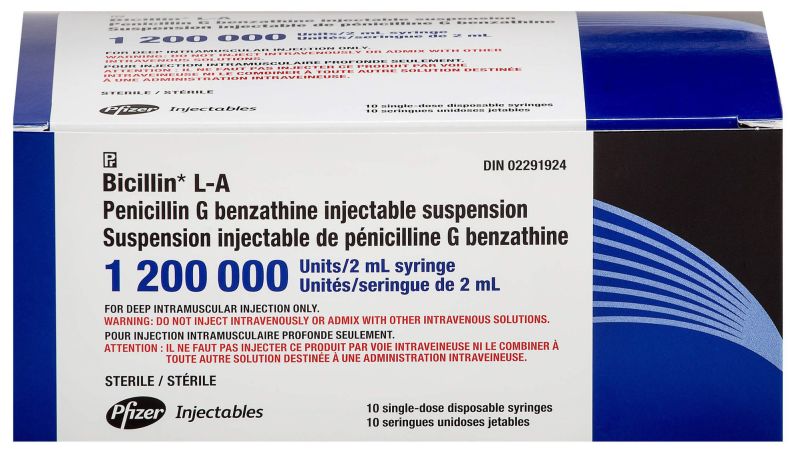In a critical update affecting maternal health, pharmaceutical giant Pfizer has raised alarms regarding the impending shortage of Bicillin L-A, a long-acting injectable form of penicillin crucial for treating syphilis during pregnancy. This antibiotic is not only a preferred choice for managing syphilis infections in expectant mothers but is also considered a vital medication for ensuring maternal and fetal health.
The announcement comes after a July 10 recall involving specific lots of Bicillin L-A due to contamination concerns, although Pfizer has assured that there have been no reported adverse effects linked to these recalled doses. The root cause of the issue has been traced back to stoppers sourced from an external vendor, prompting Pfizer to implement corrective measures to ensure patient safety and timely resolution of the supply problems.
Benzathine penicillin G, marketed as Bicillin, is primarily used to treat various bacterial infections, including strep throat in both adults and children. Its convenience stems from its long-lasting effects; one injection can be effective for up to two weeks, making it an essential option for individuals who struggle with oral medication regimens. However, while alternatives like doxycycline exist, they cannot replace Bicillin G’s specific approval and recommendation for treating syphilis in pregnant women. If diagnosed early, a single injection can prevent the transmission of the infection to the newborn, thereby averting potentially severe cases of congenital syphilis.
Without prompt treatment, syphilis in pregnancy can have catastrophic consequences, leading to miscarriages, stillbirths, and even infant fatalities. This sexually transmitted infection also poses risks of vision and hearing impairments and structural deformities in babies. Alarmingly, as syphilis rates have surged among adults, the incidence of congenital syphilis among newborns has escalated dramatically, with cases in the United States skyrocketing from 335 in 2012 to over 3,800 in 2023, according to statistics from the Centers for Disease Control and Prevention (CDC).
Experts like Dr. Jeffrey Klausner, affiliated with the Keck School of Medicine at the University of Southern California, have been sounding the alarm about the ongoing crisis of congenital syphilis and warn that the current inventory shortage could exacerbate the already dire situation. He highlights that the shots are integral to state strategies targeting increased rates of congenital syphilis, reflecting a growing concern regarding public health interventions.
Several states, including New Mexico and Minnesota, have begun to screen all pregnant women for syphilis at multiple stages of their pregnancy and upon hospital visits, particularly in emergency care settings. This proactive screening mandates immediate treatment with penicillin during the same visit upon an initial positive syphilis test result.
Despite this strategic push to control syphilis rates, the 2023 shortage has placed significant strain on healthcare systems. Measures to prioritize treatment for pregnant women include the suspension of pediatric Bicillin doses to increase adult supply for this critical demographic. The FDA has also permitted importing alternative penicillin products from Europe, but their deployment presents logistical challenges due to differing formulations and packaging.
As Pfizer continues to work on ramping up production and managing its distribution strategies, healthcare providers face strict rationing protocols. Medical request forms are now essential for practitioners to access limited Bicillin supplies, and regular updates regarding availability are anticipated.
Nonprofit organizations such as the National Coalition of STD Directors are actively gathering data to monitor the impact of the recall and shortage. Initial reports indicate widespread difficulties, with healthcare systems seeing significant returns of unused Bicillin stock amid fears that the current crisis could derail progress made over the past year in controlling syphilis and congenital syphilis rates.
However, ongoing funding cuts to national STD prevention programs, coupled with workforce reductions within the CDC, further hinder efforts to maintain testing and treatment levels for syphilis. There’s an urgent need for revamping resources and strategies to ensure comprehensive care for affected populations and to mitigate negative outcomes in maternal and child health stemming from this ongoing public health challenge.
As more information unfolds, vigilance from healthcare authorities and institutions will be crucial in averting a setback in combating syphilis and protecting future generations.












